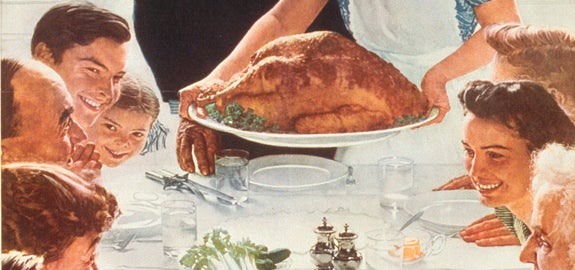My family does not really celebrate the holidays or its traditions. I have to outsource my Fourth of July barbeques, my Christmas parties, and my Harvest Moon festivals. Most New Years Eves pass with half of us already asleep by midnight. But we have one holiday tradition, started seven years ago, that makes Thanksgiving, of all holidays, the focal point. Every Thanksgiving, which happens to fall on the same week as my twin cousins’ birthdays, our two families, and some additional guests, have dinner at my parents’ house. The next day, my brother and I take our cousins out on their birthday expedition: an activity, a movie, and then dinner.
As each year passes, and random events turn into patterns, we have all become a little tradition-happy. Or rather, we love to use the word “tradition” to trump all opposing voices, to express dismay, to handcuff ourselves to the past. My dad’s cousin volunteers her house for next year’s Thanksgiving dinner, and my mother says, “But tradition.” My cousins find the PlayStation in the basement dismantled this year and wail, “But tradition!” Since we moved to Ann Arbor for school, my brother and I make the eight-hour drive to Maryland every November, and then, three days later, make the long drive back. Each time, one of us will broach the idea of staying put in Michigan next year, and save ourselves the gas money and back pain. But then, as always, tradition.
*
When I was growing up, both the tooth fairy and Santa Claus visited my house while I slept (but, for some reason, never the Easter bunny). Later, after I’d figured out both deities were imaginary, I asked my mother how she knew about these American traditions. There was no Chinese equivalent, and yet they had given me a near-perfect experience of both rituals.
“What do you mean?” my mother asked, a little dismayed at the question. “We live in America, so we know what Americans do.”
I didn’t push further, but my question remained unanswered. I wondered if a classmate had told them about Santa Claus, or a commercial, or the simple act of walking through a mall in December. If a children’s book introduced them to the tooth fairy. If they never found out about the Easter bunny, or if at this mythical creature, they finally drew the line.
The bigger question, though, was why they felt the need to adopt these rituals into their lives, and mine. Why these rituals and not others, not the ones with which they had been raised?
And the biggest question: why did I feel that my encounters with the fairy and the Claus were less authentic because my parents were not raised in the same tradition?
*
Writing teaches me that the truth is an infinitely angled thing, with each person possessing a sliver of it. Persisting to accept and speak from only this minute position is as myopic as refusing to recognize and respect the unique particle of honesty that one possesses. Tradition carries a different weight, a different light, for all of us.
I see how tradition can curdle; how tradition can camouflage and domesticate violence, excuse ineptitude, and encourage ignorance. I see, around me, people questioning tradition, plumbing its darkness, tearing it down. I applaud them and their necessary efforts. I don’t believe their destruction of tradition infringes upon my own. Yet I do still want to explain how tradition can make a new country, its written and unwritten rules, inhabitable. I want to explain my sliver of truth.
For me, tradition is a thin, solitary root tethering my family to the new ground we walk upon. In the simplest terms, I am the child of immigrants. So is my brother, and my cousins. Tradition is the house we built, with the accumulation of years and rituals substituting for brick and mortar and wood. In this house, we are sheltered, however fleetingly, from any feelings that we do not belong.
Tradition spins a cloak of rightness, of unquestioned correctness. We are not foreign or alien or wrong if we are following tradition. And when pre-existing traditions, ones rooted in a culture that we only have one foot inside, offer no comfort, we make our own.
My family’s Thanksgiving tradition, small as it is, brief as its history, provides me with more comfort than any other cultural one, American or Chinese. Perhaps, it will have to evolve, as my cousins get older, as my brother and I leave school and get real jobs. But for now, I look forward to the end of every November, not for the actual components of the ritual, but for the simple act of carrying each of them out, same as the year before.







